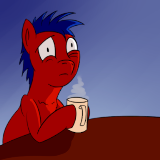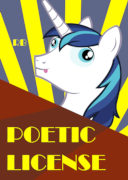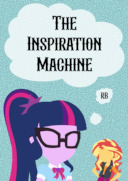Horror Stories are still Stories · 8:42pm Jan 28th, 2019
Horror Stories are Still Stories
Four pieces of actual advice for writing horror that really should go without saying.
So, it's been almost three months since I last posted anything. Truth be told, I've been rather burnt out lately (this seems to happen every year around this time, and This Town being what it is isn't helping), but I think I'm starting to come out of it now. I'm sitting on 1,979 words of the next chapter of Town, and I'm 1,304 words into the next Detective Rarity. I also have a rough idea of what the next entry in The Cosmos Eccentric is going to look like, for the people who are here for that. I say all this because I'm hoping writing this blog will help me get back in the groove.
So back in November, I wrote a blog called "Showing the Monster". It was about the bad advice I kept seeing people give to new authors interested in writing horror for the first time. I know at least one of you read it.1
That leaves the question, though, of what good advice for writing horror is, which is going to be the subject of this blog.
Preface, before we get into that: I am not a great horror writer. If you want a great horror writer, go talk to Horse Voice. I also do not have a degree in English or Literature Studies. Actually, I don't have any degrees at the moment. College is hard. This is why I build websites for a living.
What I mean to say is that I am not qualified to write the kind of blog I'm about to write2. But I'm going to do it anyway, because lord bloody knows no one else is going to. Just take it with a grain of salt, yeah?
Yeah.
Let's get started.
1: Your Characters are Important
Should go without saying, but apparently it still needs to be said.
Have you ever noticed that people tend to root for the killer in a lot of classic slasher films? This is why. Creators of slasher films went out of their way to make most of their victims either bland or outright unlikable so that the audience wouldn't feel bad when Jason pinned them to a tree with a machete. Coincidentally, the only characters in these movies that actually get any development are usually the survivors.3
This is a perfect example of why characterization matters in horror, perhaps even more so than in some other genres. If your characters are unlikable, boring, or underdeveloped, then your readers won't care what happens to them. Dorothy Jones Heydt said it best back in 1991: "I don't care what happens to these people."
And if we don't care what happens to the characters, we have no reason to fear for their safety. Your tension dissolves in an instant. That's no good.4
Characters are an important part of any story, and horror is no exception. So, give them a little love.
And speaking of story...
2: Your Story is Important
This also should go without saying, and also apparently needs to be said. Especially to Hollywood, which seems to have convinced everyone otherwise.
A lot of the horror I have read, and seen, is analogous to a haunted house ride: the story and characters serve only to move us from one room of the house to the next so that something new can pop out from behind a bookshelf and go 'boo'.
And most of the horror I have seen read is also very, very unmemorable.
Good horror stories are not just a chain of spooky things happening. They are a cohesive whole, with plot progression, acts, arcs, character development, themes, and any other buzzwords you feel like adding to that list. If you want to write good horror stories, you need to be able to write good stories first.
And this is what is missing from a lot of contemporary horror—and a lot of the horror you find on this site. It forgets to tell a story.
And beyond that, make your stories about something. Carrie is a story about going through the horrors of being a teenager. IT is a story about childhood and adulthood, and the loss of the former. The Shining is a story about an abusive relationship and a very, very scared child caught in the middle.5 These stories are made all the more powerful, and all the more terrifying, because they can be related to. They have a human element to them, and they explore familiar themes.
The world is a scary place, and it is full of scary things. Horror is a way of examining what terrifies us, of making it concrete, of giving us the chance to come to grips with it—or even to fight back.
Don't waste it on a haunted house ride.
3: Be Original
I am so sick of Zalgo eyes.
For those unaware, Zalgo is an old creepypasta/meme that started in the early 2000s. It's sort of an eldritch-type thing. You may know it as the source of t͍̭hi̠s̺̯̮ ̛̻̣̮̩̺̫̰s̞͓̱͎͇͚o̡̱̠͔r̴̼̩̣̥̘t̡͖̠͉͖ ͈̀o͇f̪̟̖̦̤́ ͏̗͕̟̺̗̯͔t̬̮̝e̦̦̗̘͙̺x̶͕t̪͎̟̼.͉
The other thing Zalgo is known for is images of people with blacked out melty eyes. You know the ones. It's the kind they use to denote that something is evil.
Now, this predates Zalgo, and the internet, too. But my guess is that Zalgo is the reason why it keeps showing up.
I watched a horror film last night on Netflix6. I'm going to describe something that happened in it, and I want you to guess what movie it was.
The protagonist is walking up to a bed. There is a child on the bed, no more than six or seven, sitting upright and facing away from the protagonist. The camera does not show their face. The protagonist says something comforting, and reaches out her hand to touch the child's cheek. Then, just as she is about to make contact, the child's head whips around. Their eyes are pitch black. The music jumps up in intensity. The child says something menacing.
I asked this question in Fimfic's Discord's #general channel. They didn't manage to guess the movie (incidentally, it's in this footnote7), but they were able to come up with a list of over a dozen movies they thought it might be from. And most of them have a scene similar to this one!
This scene isn't scary anymore. It's been done enough times that it's almost laughable now.
And it's even worse when I see it pop up in fics, being an entirely visual effect. And boy oh boy does it pop up in fics a lot.
This is a good example of desensitization. If we are exposed to the same stimulus repeatedly, its effects are reduced until it can barely induce a response at all. The same goes for your typical horror monsters: no one finds zombies particularly interesting anymore, nor vampires, nor werewolves or mummies or Japanese girls with long black hair. We've seen it all before.
And I know they say that there's nothing new under the sun, but that's bullshit and we all know it, so stop deluding yourself into thinking that you can't be original and use that big, beautiful imagination that I know you have. Find something new to scare people, or find a way to make an old concept interesting again. Don't be afraid to experiment, either; for as rich of a history as horror has, it's nowhere near as deeply explored as most of its peers. Go wild.
But for the love of god, enough of the Zalgo.
4: Read Horror
These days, most people's introduction to horror as a genre is through film.
Film is a great medium for horror.
We are not making films.
Prosaic horror is very, very, very different from cinematic horror. Cinematic horror has the ability to rely on visuals and score to create tension—or to induce fright. If you've gotten this far into the blog, you've probably seen at least one horror movie, which means you've probably gotten jumpscared at least once in your life. Film can also play at common fears more readily than prose; being a visual medium, it can simply present you with a gutted corpse, or a disfigured monster, and it will have an effect. It's how our brains are wired.
This is what film is good at—it can communicate horror visually. This is why so many hit horror films have mediocre stories. The spectacle is more than enough to get most audiences the fix they want.
Prosaic horror doesn't have this to fall back on. Film is overt, but prose is subtle. And so, it has to rely on other tricks to generate tension and unsettle its readers.
And the best way to learn these tricks is from the masters.
So, go read some King, or some Poe, or some Lovecraft8. Go read Dracula, or House of Leaves9.
And beyond that, just... read, in general. This is less horror advice and more just writing advice, but it's easily the #1 most important thing for anyone writing anything. It's also easily the piece of advice we give out the most in #writing-help. Yes, it is that important. It'll expand your horizons, it's the best way to learn the more abstract mechanics of writing, and it's good for your brain, too.10
So, go give your local bookseller of library some patronage. Heck, ask them for some recommendations, they love that. You'll thank me later.
So, in Conclusion...
Horror is a hard genre to write well in. Honestly, alongside comedy, I'd say it's one of the hardest to perfect. But for various reasons, it is seen as being an easy genre, when really this isn't true. It's just that it's common fodder for people who don't really know what they're doing.
And that's okay! Everyone starts out with no idea what they're doing. That's how any artistic medium works. You see the same thing with comedy and romance. But unlike with comedy and romance, there aren't a lot of resources available for new horror writers, nor is there a large collection of good literature to study, nor is there even a large audience for it in the first place. We've already established that most of the advice floating around for writing horror is bung.
And that's a damn shame, because horror done right can be a powerful thing! But it's hard to do right, and that's why we need to guide new horror writers, so that they can develop in the right direction and write stories that actually matter.
I think horror, as a genre, deserves a better lot than it gets. Writing things like this is me trying, in some small, arrogant way, to set that right. Hopefully someday these ramblings can help someone out there create something they can be proud of.
Because dammit, I want some good reading material for once.
Yours in pretension and poltergeists,
-RB
- I hope.
- But on the other hand, I am using footnotes, which as we all know are the sure sign of an enlightened mind.
- Sometimes I wonder if we should give slasher directors more credit. Then I remember that Jason X exists and change my mind.
- As a note for fanfiction specifically, because I had to explain this to someone in #writing-help recently (yes, that #writing-help), you usually can't rely on your audience's preexisting attachment towards the characters you're using. If your characters are written with the depth of a wooden board, then they'll still come across as a wooden board even if you put a purple wig on them and call them Twilight Sparkle.
- You may notice that all of these works are by Stephen King. There's a reason he's pretty much the only contemporary horror writer anyone gives a damn about.
- Actually, I watched three, and one more in a theatre. 3/4ths of them were disappointing, and the fourth was made by the guy who did Trollhunter.
- The film was Mara, a very dull film about sleep paralysis and the Old Hag. I don't recommend it.
- Don't get too into Lovecraft, though. It's really easy to get fixated on the monsters and miss the point entirely.
- Not necessarily a horror story, but still a fantastic study on how to give your readers the willies.
- And I mean actual books, not fanfic. If fanfic writers only read the output of other fanfic writers, then things start to get incestuous after a while. This is how you end up with five thousand nigh-identical Displaced stories.






Steven King is pretty excellent. By coincidence, I just wrote a quick note observing that Steven King stories and Equestria Girls actually have a tremendous amount of overlap, and work in similar ways. It's just that Steven King is horror, so it's more disturbing and there are bigger consequences. But the structure of the stories, and even the world, works basically the same.
On that note, you should totally read his book On Writing. It's really very good.
And seconded, the most important thing is to make the audience care about your characters. And just as important, you can't just crank up the misery. You need to give your characters something to lose or, that failing, at least hope. Otherwise the readers won't engage.
You know, RB_, I read your previous blog on horror advice as well as this one.
I agree with almost every single point. However, there is one more point I think I should add:
Know Your Audience.
There are a couple genres of stories that are more subjective than other genres. These mostly include Comedy and Horror (Which makes sense because, Comedy to Horror are actually two absolutes of the same sliding scale. It's a psychology thing.) This is why these two genres are the hardest to master. Because one can easily master a certain type of comedy/horror, but that will only appeal to certain kinds of audiences. To truly become a master at comedy or horror, one has to be able successfully pull off multiple different types of comedy/horror, therefore appealing to several audiences.
Now, I don't really like watching horror. I could explain my reasoning as to why, but I'd rather leave it like that because it would take too long. However, I absolutely love reading horror. Again, I am just gonna leave like that.
This is a phrase that even though it is not 100% accurate, I think it stands true many times:
A horror story will be scary. It enacts your primal fight or flight instinct. It causes you to want to jump and run.
A good horror story will be creepy. It will enact your fears, anxieties, and worries. It causes you to become paranoid, afraid of what might happen.
A great horror story will be eerie. It will invade your senses, cloud your judgment or understanding. It has some sort of sense of relatability to reality causing you to squirm.
An excellent horror story does all three. It appropriately times each and every detail to every scene. Everything is planned. You didn't read the book. The book read you.
Signing out, VShuffler42
I got turned onto your horror advice series... somehow. And I think it’s pretty enjoyable and informative. I came to horror 100% through ponyfic; for the most part I genuinely don’t enjoy horror movies. But horror-ponyfic can be pretty good stuff.
I haven’t read much horror outside of pony. Sometimes I wonder if I should dig into it more, and if there’s a better way to test those waters other than grabbing some random Stephen King and seeing what happens.
Regardless, this is an interesting series. Thank you for it.
5104559
I'm glad you've enjoyed them
If you ever do want to try getting into literary horror, a good place to start is with short story collections. King's are all a fun time, particularly his older ones, but collections of Poe's and Bradbury's works are also great jumping off points.
5104778
Aha, I’d forgotten about Bradbury! I do enjoy me some Bradbury. That seems way more approachable than the gazillions of Stephen King everythings.
Thank you sir.